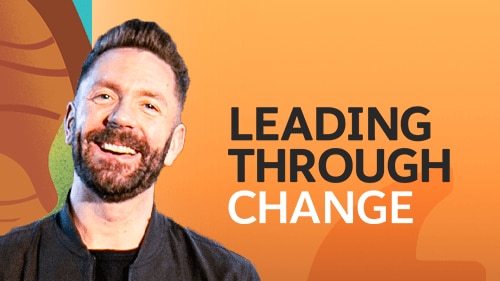Gareth Jones is Senior Vice President and Global Marketing Director of Wunderman Thompson, a WPP company, and a Salesforce customer.
There’s an old saying that the best way to innovate is to have a good idea and not enough time to execute it. My digital agency Wunderman Thompson experienced that firsthand in mid-March when Transform, our two-day conference on brand creativity, had to be postponed due to the COVID-19 pandemic. With some swift brainstorming and teamwork, we pivoted and created the Sofa Sets Virtual Music Festival featuring artists like Aurora, Jade Bird, mxmtoon, and Taylor Janzen. From idea to execution, the whole thing was done in just two weeks – with all of the IT development happening in a five-day sprint leading up to the event.
The original Transform event had sessions in which artists would perform and then chat with marketers about the creative process. Our first thought for the quarantine version was to get musicians to do informal virtual performances, followed by a short online Q&A. That was an okay idea, but we knew everyone under the sun would be doing the same thing soon. We needed to make this different.
The very next thought we had was around data. Wunderman Thompson’s mission is to try and enact behavioral change. How could we use metrics from the event and apply them to slowing the spread of COVID-19? We thought we could create an algorithm that uses real-time audience data to highlight the importance of social distancing.
Now we were onto something. We just had to build it — in less than a week.
The sprint begins
Unlike most projects, we didn’t have a work-back schedule with Sofa Sets. It gives me a chill down my spine when I write that because not having a step-by-step plan is usually a recipe for disaster. But, we wanted to put this out in the (virtual) world super quickly. We put a stick in the sand for April 3 and ran – or you could say sprinted – toward that. The good news is our teams were used to working remotely, so that made collaboration pretty smooth.
Our first step was to figure out what our tech platform would be. Given the short amount of time, we decided the best way to stream would be on YouTube. And then, my partners suggested using Salesforce technologies to power it – Marketing Cloud to distribute campaign messaging and Heroku for app development.
The creative team at Wunderman Thompson had never used Heroku before. But my colleagues Josh Pierry and Jason Carmel spun up a little demo and gave them access so they could start uploading files. They were on their way within a few hours.
Three days later, most of the Sofa Sets site was ready to go, and all hosted on Heroku. And then things really started taking off from there.
One idea led to another, and then another. For example, during a brainstorm, we came up with the concept to create an algorithm that would turn our audience reach into something tangible, like the number of lives saved by tuning into the show from home. Shane Atchison, Wunderman Thompson’s North America CEO, took that a step further, wondering if we could compare data from different locations.
It was an ambitious task, but the team built it without any pushback or internal debate about whether it was possible.
It all happened organically. It was an example of what you can
achieve when you move fast, together, in the face of adversity.
That was symbolic of the whole project. If the world had been normal, we would have approached this idea completely differently. There would have been many layers of approvals for ideas. We would’ve spent weeks architecting and building the platform. We would’ve fully prepped the artists and filmed and edited all the content. It would’ve cost a lot more money and been a much heavier lift for everyone.
Of course, we couldn’t do any of that due to the pandemic. Our constraints led to the main idea – artists performing from their sofa using a cellphone or a laptop. But the constraints guided the details too. There were several occasions during brainstorms when we’d say, "Okay, what we’ll do is send a film crew, and … Oh no, we can’t do that." Or, "Wouldn’t it be awesome if the artist signed a record that we could send out to fans? Oh no, we can’t do that.”
We stripped away all the extra stuff and focused on what was important. Certain elements were super-reliable. We knew Heroku would work. We knew Marketing Cloud would work.
That meant we could freestyle with other things and take a
few more risks because we had a dependable foundation.
Ready for showtime
The event went well, but it didn’t go perfectly. A snowstorm in Norway meant our first act, Aurora, couldn’t get on the Internet. Another performer accidentally fell foul of YouTube’s copyright algorithm. And then the most terrifying and limiting factor was the quality of people’s Wi-Fi connections. It made me realize, despite all this effort, we live in a world in which we are dependent on our internet connection for communication.
There’s actually a wonderful humanity this exposes – connecting in a way that’s fallible and may go a bit wrong. It creates a different experience, which I think is the essence of Sofa Sets. It’s a bit rough around the edges, but that’s what the world needs right now.
The performers felt a real connection with the audience
because they were seeing all their comments on their
screen in real time. And there was no one directing them.
We didn’t tell them where to sit in their home. We didn’t advise them on their setup beyond the sound quality. They loved that.
As you can imagine, we were all panicking when an act didn’t go live, or there was a delay. But the feedback we got was that the imperfection was actually quite charming. Viewers weren’t storming off to do something else. They rolled with it and even felt an extra connection with what we were trying to do.
We tracked performance metrics across three axes: viewership, total reach through social media, and target audience engagement. Here are some key metrics:
- Cumulative #SofaSets Viewers: 28,139
- Potential impact of social distancing while watching #SofaSets:
- Projected Hospital Stays Reduced: 7,153 – Compared to infection rates from a comparable sized live-person event, assuming 15% hospitalization rate, over the next 28 days. (Source)
- Projected Ventilators Spared: 2,378 – Assuming 5% of cases require the use of assistive oxygen or ventilators, over the next 28 days. (Source)
- Projected Lives Saved: 430 – Based on a presumed fatality rate of 0.90% across the total infected population, over the next 28 days.
A new concert experience
I’ve thought a lot about how the current crisis will impact the future. After the pandemic ends, I believe events will be much smaller, more virtual, and much quicker to market from planning to execution.
As our CEO Mark Reed said, "We’ve seen 10 years of
innovation in four weeks," which is absolutely right.
Do I think virtual events are going to become the norm? No, because humans, in general, are social creatures. They want to experience things in person. I think we’ll see more mixing of real and virtual worlds.
For example, there could be an in-person concert with a virtual “backstage” meet-and-greet after the show. A performer like Aurora could do a series of five-minute chats with small groups over video conferencing. That’s easier to do when the performer is in their own private space. It becomes a much more palatable way for people to have one-to-one (or one-to-several) connections. And I think that’s where there will be opportunities for additional revenue, in addition to advertising.
Wunderman Thompson is potentially using this format as a way to showcase emerging talent in front of clients. Also, how can we use the platform to reach out to other micro-audiences? What other iterations of Sofa Sets beyond music could we put on? There’s no shortage of possibilities.
In the meantime, I can pass along some simple advice for anyone working on an ambitious project during this time. Don’t think too hard, jump in, and make it happen. That’s where innovation lies. It’s messy, it’s fun, it drives a purpose, and, even if you fail, you’re still learning something.
Join us for the webinar, “How Wunderman Thompson Built a Digital Experience on Heroku in Just 5 Days.” Register here.




























